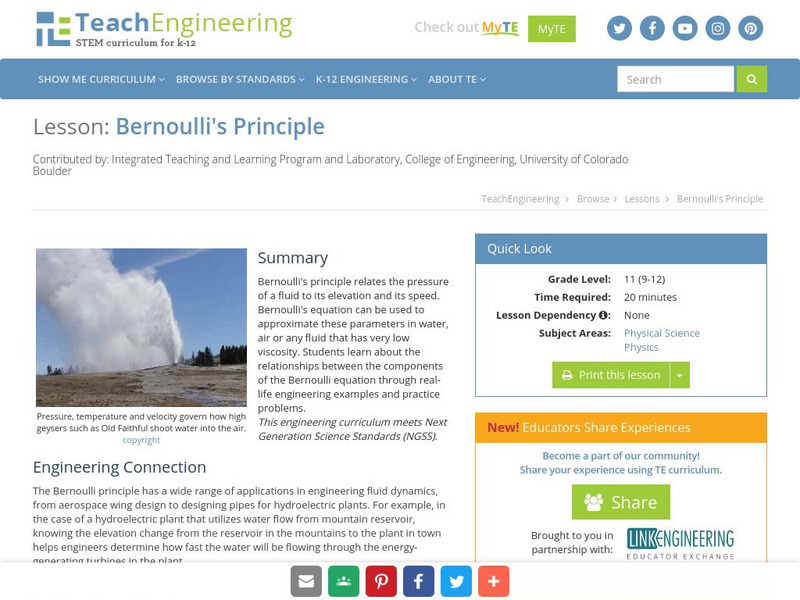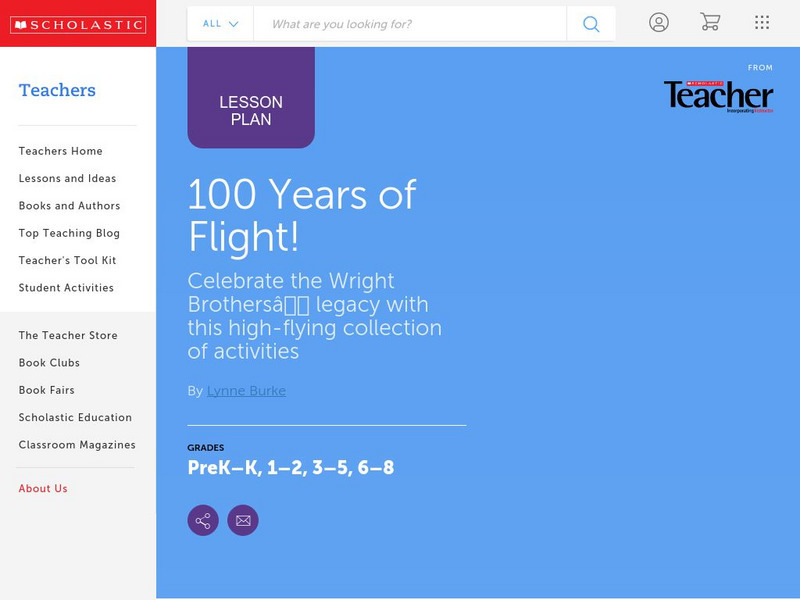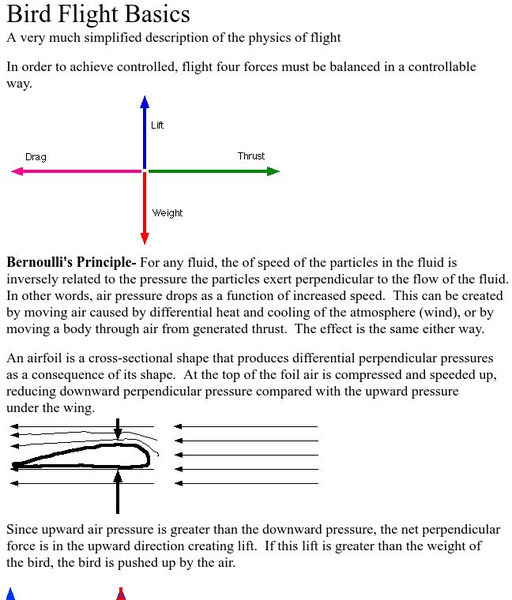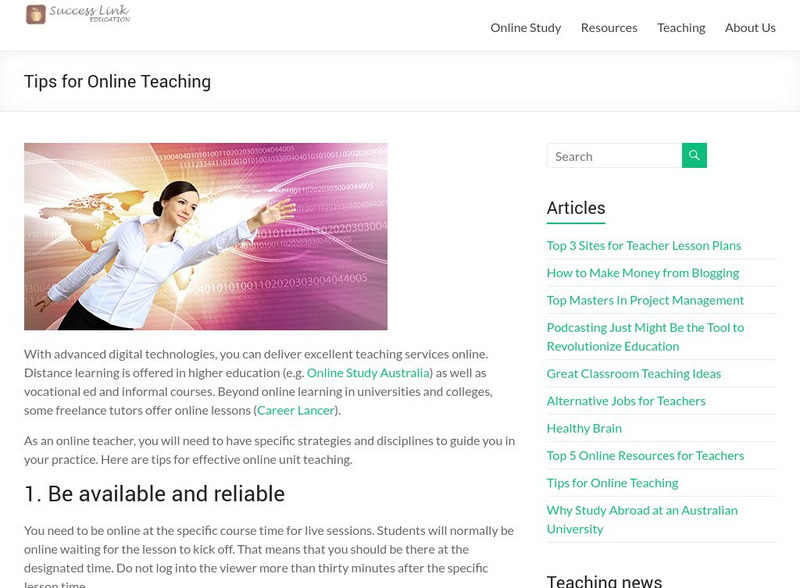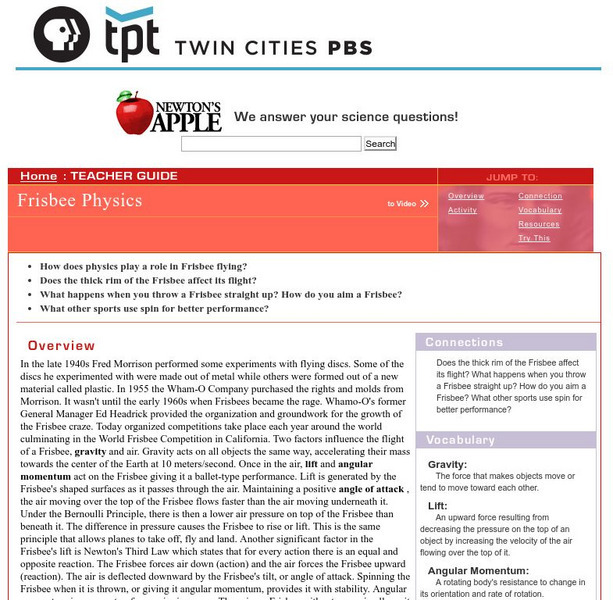Smithsonian Institution
Smithsonian Learning Lab: How Things Fly: Activities for Teaching Flight
Through this series of three lessons, students will gain an understanding of the basics of flight. They will learn about the four forces of flight and practice their observation skills through a number of fun experiments. In addition,...
Other
Allstar Network: Flight
This comprehensive and informative site looks at the history and principles of flight.
TeachEngineering
Teach Engineering: Bernoulli's Principle
Bernoulli's principle relates the pressure of a fluid to its elevation and its speed. Bernoulli's equation can be used to approximate these parameters in water, air or any fluid that has very low viscosity. Students learn about the...
Scholastic
Scholastic Instructor: 100 Years of Flight
Learn more about the first "100 Years of Flight" when you explore this article. It features resources, historical background knowledge and more.
PBS
Pbs Teachers: Scientific American: Flying High: Bird Man
Investigate and demonstrate principles of flight with the Flying Tim Bird. Draw a hypothetical model of the mechanism inside the toy bird that makes the wings flap, then experiment with and videotape its flight to explain how lift works...
The Franklin Institute
Franklin Institute Online: The Challenge of Flight
Think about the challenges that faced the Wright Brothers, then see if you can design and fly your own model aircraft. There are other sources provided to help you along the way.
Other
Pacifier Online: Bird Flight Basics
This site provides a simplified explanation of the physics of flight. Site provides information about lift, drag, weight, thrust, Bernoulli's Principle, and much more.
PBS
Pbs Teachers: Scientific American: Flying Free: Make a Wind Tunnel
Investigate the science of flight, the tilt or angle of attack of a wing's surface and the effect of control surfaces. Construct a model of an open jet wind tunnel using a household desk fan to produce a flow of air.
PBS
Pbs Teachers: Scientific American: Flying Free: Winging It
Explore flight and the science behind lift and wing shape by creating two paper airplanes - a monoplane glider and a ring-wing glider.
Alabama Learning Exchange
Alex: Building a Paper Airplane Using Bernoulli's Principle
This is a culmination activity used after students have studied Bernoulli's Principle as part of a unit on forces and fluids. Students will use the Internet, textbooks, library resources and their cooperative learning group to design...
TeachEngineering
Teach Engineering: Up, Up and Away! Airplanes
The airplanes unit begins with a lesson on how airplanes create lift, which involves a discussion of air pressure and how wings use Bernoulli's Principle to change air pressure. Following the lessons on lift, students explore the other...
Science Buddies
Science Buddies: The 'Ultimate' Science Fair Project: Flying Disk Aerodynamics
Tossing a Frisbee with your friends is a great way to have fun in the sun. As you practice your throws and become more accurate, you're learning about the aerodynamics of Frisbee flight intuitively. You're learning the body mechanics...
Science Buddies
Science Buddies: Up, Up, and Away in Your Own Hot Air Balloon!
In this science fair project, students will make hot-air balloons using a toaster and dry-cleaning bags, and see how the size of the balloon affects its flight. The Science Buddies project ideas are set up consistently beginning with an...
NASA
Ltp: Rocket Principles
Excellent NASA sponsored site on the principles of rockets. The site relates Newton's 3 laws to the flight of a rocket. Site also has links to activities related to rockets in addition to links about practical rocketry.
PBS
Pbs Teachers: Delta Wing Flyer Experiment
Investigate principals of flight by building a delta wing flyer from soda straws and newspaper. Test it to see how well it flies.
TeachEngineering
Teach Engineering: Windy Tunnel
The purpose of this activity is to demonstrate Bernoulli's Principle as it relates to winged flight. The students will use computers to see the influence of camber and airfoil angle of attack on the lift.
University of Minnesota
The Physics of Flight: Bernoulli's Principle
Discusses air flow around the wing of a plane and its effect upon the lift and drag forces. Focuses on the application of Bernoulli's principle to wing design and the subsequent airfoil shapes.
Success Link
Success Link: Flying Into Spring
Here are two lesson plans that apply geometric concepts to design objects. The first involves students as a group following step by step instructions on making a kite. After the review of geometry vocabulary, in cooperative groups the...
NASA
Nasa: Aerodynamics Index
Are you studying or teaching Aerodynamics? This page acts as an index to all the terminology related to this topic. Clicking on any title will open a page with a colored slide and a scientific explanation of the contents. Animated,...
TryEngineering
Try Engineering: Water Rocket Launch
The main focus of this lesson is learning about aerospace engineering and the principles of rocketry. To accomplish this, students will work in teams to design, build, and launch a rocket made out of a soda bottle, then present their...
MadSci Network
Mad Scientist Network: How Do Planes Fly Upside Down?
Question and answer regarding the physics principles that apply to a plane flying upside down.
PBS
Newton's Apple: Frisbee Physics
This teacher's guide from Public Television's Newton's Apple discusses and illustrates the physics principles governing the flight of a frisbee. Includes teacher lesson plans, activity ideas, discussion questions, and information about...
Other
See How It Flies: Airfoils and Airflow
One chapter from a larger site dedicated to explaining the physics of flight. Numerous diagrams show the flow of air around an airfoil.
Exploratorium
Exploratorium: Hoopster
Students create their own airplane using straws and other materials and learn the principles of aerodynamics.


